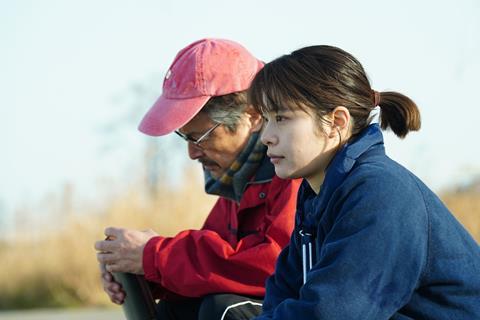Sombre, sensitive portrait of a young professional female boxer in Japan

Dir. Sho Miyake. Japan/ France. 2022. 99 mins.
The book that inspired Sho Miyake’s new film is entitled ’Makenaide’, meaning ‘do not lose’ in Japanese. But the adaptation’s less bullish English title is oddly accurate when it comes to describing the film itself: Small, Slow But Steady, to which one could also add, sombre, sensitive and sentiment-free. This is the factually-based portrait of a young female boxer sparring not only with her opponents but with the restrictions arising from lifelong deafness; and while the subject might conventionally be expected to spark an energetic, life-affirming, fists-raised-high treatment, Mikaye (2018’s And Your Bird Can Sing) instead offers what must surely be the most downbeat, introspective boxing movie ever. It’s as if Ozu rather than Clint Eastwood had made Million Dollar Baby. The somewhat chilly and profoundly melancholic result will have limited appeal, but anyone committed to the more contemplative, emotionally refined end of the current Japanese art cinema spectrum will find this against-the-grain study genuinely alluring.
The most downbeat, introspective boxing movie ever
Played by Yukino Kishii, the film’s heroine – here called Keiko Ogawa – is a young woman who has been deaf since birth and who, it’s eventually revealed, took up boxing in reaction to being bullied in her childhood and teens, and as a way to deal with stress in her daily life. Not that Keiko herself reveals much at first. Occasionally, sometimes reluctantly communicating in writing or sign language, she’s an introspective, isolated woman who seems to shun company, and who really comes to life when training in the long-established Tokyo gym run by ageing Mr Sasaki (Tomokazu Miura), and in her occasional bouts as a pro boxer. The rest of the time, she shares a flat with her musically-inclined brother Seiji (Himi Sato), with whom she has a testy, detached relationship, and works as a chambermaid in a hotel.
Long sections of the film, which is extremely spare with dialogue – with the occasional caption imparting dates or information about Keiko – shows her rigorously undergoing training. Sequences in which she practices rhythmic, almost metronomic sparring skills give the film a quasi-musical edge, and establish its status as something of an existential study, in that Keiki absolutely is what she does: that is, we learn a little about her personality and her motivations, but this is absolutely not a psychological study, more a portrait of a woman pursuing a discipline that is Zen-like in its exactitude.
Keiko’s training and her fights – victorious and otherwise – are alternated with intimate scenes featuring Mr Sasaki as he attends hospital tests for his declining health, which will soon result in him closing his gym. We also see Keiko’s trainers (Masaki Miura, Shinichiro Matsuura) supportively setting her up with a new coach for when Sasaki’s place shuts down, only to find Keiko’s determined insularity potentially gumming up the works.
Beyond its very sparse narrative content, this is very much a study of a city - particularly in winter. Keiko is often seen exercising by the riverside in a Tokyo that at times seems eerily deserted, especially in the haunting cityscapes of the closing title sequences (the timeframe, beginning in December 2020, may have something to do with that, deserted streets already familiar as a recurrent motif of Covid-era cinema). The interiors captured by DoP Yuta Tsukinaga are similarly functional – Keiko’s flat clearly a space designed for living and nothing more, with no trimmings required – while shots of Sasaki’s gym approaching closure have an uncanny quality to their emptiness.
As played by Kishii, Keiko herself appears at once pugnacious, vulnerable and ferociously closed – her impassive expressions revealing less about her than the plasters that dress her cuts and bruises. It’s a subtle performance, at times seemingly limited in range, but that’s the point. The rare moments when Keiko cracks a half-smile, especially when she starts forming a closer rapport with her brother, are all the more telling because of the contrast with her opacity. In the same way, the boxing scenes are all the more powerful because the sound design cuts out all superfluous noise - no background cheers from the audience, for example, just the intense heightened sound of Keiko’s breathing.
This is a rare sports film in that it doesn’t end with clear victory or defeat – in fact, it doesn’t really offer a definite ending at all, but rather leaves us wondering where Keiki goes from here, and what her world will be like. Those closing city shots suggest it will be a solitary one, but by this point we also understand the nature of Keiko’s solitude - how much it’s her strength and her choice, rather than her burden. The film refrains from diagnosing or analysing – either Keiko’s psyche or her condition – but describes and evokes her world with subtle detached insight. It does so on a miniature scale that some might find frustrating or non-committal, but that allows director Miyake to give us Keiko in close-up, yet in a manner that’s scrupulously non-intrusive too.
Production companies: Nagoya Broadcasting Network, Keiko me wo sumasete Production Committee
International sales: Charades, sales@charades.eu
Screenplay: Sho Miyake, Masaaki Sakai, based on Makenaide by Keiko Ogasawara
Cinematography: Yuta Tsukinaga
Editor: Keiko Okawa
Production design: Shimpei Inoue
Main cast: Yukino Kishii, Tomokazu Miura, Masaki Miura, Shinichiro Matsuura
























